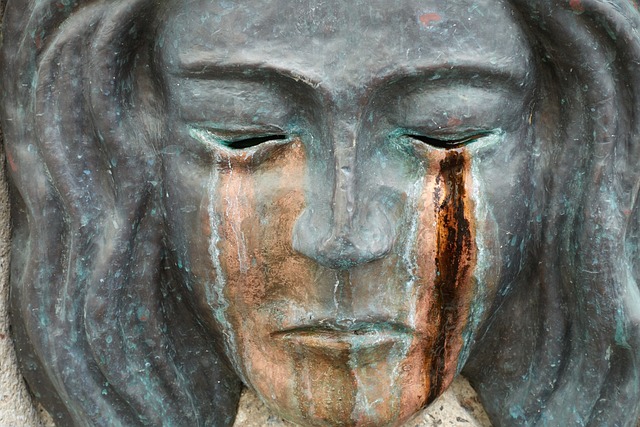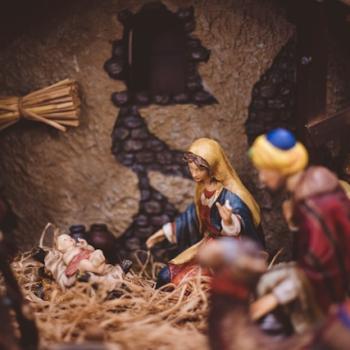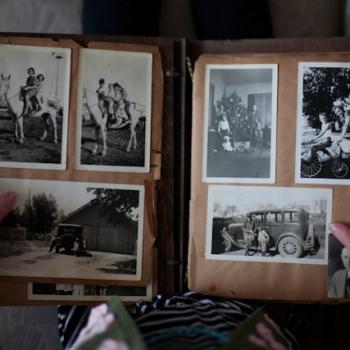
In the last several articles, I have been playing around with Biblical lessons around community and family interactions. While I don’t follow any strict rule on what topic I choose, I do tend to follow a trend. We have recently looked at Sci-Fi horror Caddo Lake and The Bird Box, and the animation film 9 among others. Mostly we have discussed why kind of impact we as Christians make on the community around us. What we leave behind. The movie Foe, however, seems to have more to say about how our community impacts us.
It is a movie that deals deeply with the tension between who we are and how we define ourselves. There is nothing more foundational to how we live our lives than our sense of identity. There are many places, valid and not, where we derive that from. Foe, I think, zeros in on one of humanity’s most common source of identity.
Each other.
Do I Stay or Do I Go?
Foe introduces us to a young couple struggling to keep a farm alive as the world is dying. The setting doesn’t seem to have a lot of science-fiction elements. However, in the opening, we learn that androids existd in this world. They are very much like the androids in the Science Fiction cult classic, Blade Runner. For all intents and purposes, they are human, created from flash and blood. They are more like clones but in the movie, they are described as robots.
In the opening of the movie, we meet Hen and her husband Junior. They are struggling with a strained marriage. Hen is particularly cold towards Junior, who in return seems a little lost. The tension in the marriage is clear. Hen is not angry with Junior, rather she seems terrified. Junior, on the other hand, comes across as confused. He deeply loves his wife and doesn’t understand why she will not be with him.
Shortly into the movie a man named Terrance approaches their home. He informs Junior a company building a space station that orbits Earth has impressed him into its service. He will, he explains, be replacing Junior with a robotic replica in order to provide Hen the stability she needs while her husband is gone.
The relationship between Hen and Junior starts to build. Hen seems unsure if she can trust Junior or not but is slowly being won over. Until that is, Terrance arrives at their door again. He says he will be living with them to study Junior’s day-to-day life. He wants to know how to best program the replacement.
From that moment on the tension only grows. Terrance’s tests grow more and more brutal, as does his sadistic pleasure in them. What’s more, he seems to be making advances on Hen, and spending long hours speaking with her. Junior is afraid that Terrance himself will be his replacement. He is afraid that he will loose the one thing in his life that he holds in the highest value.
When Everything Implodes.
The climactic moment of the movie shows Junior, what we now know is the real Junior, returning from space. The viewer discovers, along with Junior, that he is the robot. He is the replacement promised for Hen.
In a heart-wrenching and truly agonizing scene, we watch the robotic Junior we, as well as Hen, have come to care for, be tormented and killed. The entire time he cries for Hen, begging not for his own life but for her.
Hen is taken from the house when she reacts emotionally to the scenario. The real Junior, however, seems unshaken. If anything he is curious and disgusted, watching his other self be killed and packaged to be shipped away.
Not long after the horrific death of the robotic Junior, Hen and her husband get into an argument. He, unlike the robotic version of himself, seems more controlling and entitled. He is angry that Hen had feelings for the ‘other him’. He’s disgusted almost as much by her as he was by the other Junior.
It is indicated, in the end of the movie, that Hen escapes the home and her marriage, aided by Terrance. She disappears in the middle of the night. When Junior wakes up a sweeter more compliant version of Hen returns to him. The indication is that Terrance has fulfilled Hen’s desire for escape by cloning her.
My Husband Verses My Wife.
Identity is a complex thing. In recent years, it has grown in the minds of many Western individuals. However, even when we don’t give it much thought, identity is extremely important. We act out of who we believe we are. Our behavior cannot change until our identity does.
Through the duality of the character Junior in Foe, we come to see two of the most common ways people find their identity. Junior the Clone, with his puppy dog love and his gentleness, is the character we may find more “human” and relatable. His way of identifying is more socially advantageous, and thus, more acceptable. I don’t entirely know if we can say it hurts people less, however.
Junior the Clone finds his identity in the people around him. He identified himself as Hen’s Husband, and his life revolved around her. His depression and aimlessness when she didn’t seem to return his love becomes purpose and fortitude when he sees that love returned. He steps into a role as a protector and supporter with purpose, not because he identifies with the role, but because he identifies with Hen. Mundane tasks suddenly have purpose and direction. He has something to live for, but also something to fear.
When Junior the Clone discovers that he is not “Hen’s Husband”, everything crumbles. We are left watching a shell of a man writhing on the floor in tears and agony. Yes, the things done to him are cruel, but it is clear from the acting and storytelling that Junior the Clone cares only about Hen. For her safety, but also for her to return and affirm his identity. When he loses her, he no longer fights for himself.
In contrast, we have Junior the original. Junior the original still derives his identity from the social structure around him. However, his mentality is one that centers on himself. He is not Hen’s Husband, instead, Hen is “His Wife”. Because of this outlook, he must control and regulate the things in his world to fit this reality.
Many of us have known people like this. Outwardly, they seem dangerous to the social structure. As long as they have power, control, and leadership, they can maintain their concept of self and can stay stable. If, however, they are not able to do that, they become violent, aggressive, and sometimes even deadly. Think of, for instance, the stalker who continues to find a reason to imagine the person they obsess over really will love them if the circumstances are just right. Or the parent, who cannot imagine they may be bad mom to a disobedient child, and must instead force the child to conform.
Both versions of identity are derived from others. Junior the Clone may seem preferable to most. His gentleness and his brokenness call us to act to protect him. However, this co-dependent type of identity is just as damaging as the controlling, narcissistic type shown by Junior the Original.
Junior the Original feels more outright oppressive, and the hint of arrogance and disgust he shows both to his clone and to his wife is abrasive. However, his negative traits are largely driven by fear. If he loses his identity, he loses his foundation for life. It is because of that he cannot afford to lose control for even a second. He is constantly striving to force the world around him into line with his mindset for fear that it will crush him should he lose control. Not only is he hurting others around him, but himself.
Junior the Clone seems like the preferable version. Especially if you yourself have a personality closer to Junior the Original. It’s nice to have someone who conforms quickly to your version of them. It’s not as exhausting and you don’t have to fight your fantasy. It’s easier to have someone who doesn’t challenge your own sense of identity. This is why co-dependant types are so often victimized by narcissistic types.
So Junior the Clone is more socially acceptable and even more ‘loveable’. However, it is not sustainable. Not only is the constant shifting of expectations and definitions of self incredibly damaging on the person holding these senses of self, its eventually exhausting for that person’s support system too. As someone who personally tends more to this way of defining myself, I cannot express how many friends I’ve lost because they got sick of telling me their version of my identity. Junior the Clone cannot be Junior, Hen’s Husband Junior the Space Station Worker and Junior the Employee, and many many more impossible things. He must have a center. If not, he is off-kilter, breaking everything in his unstable orbit.
In this way, at least. the Narcissistic types are at an advantage. As long as they get their way, they look much more stable. Some can successfully avoid challenging their identity for most of their lives, even to those closest to them. Often the people they sacrifice to maintain that identity aren’t even aware of the damage happening until its too late.
What are we to do, then? Where are we to find our identity?

Christian.
The word “Christian” means “little Christ”. It is a meaning that has been lost in the soup of traits that have since come to mean “Christian”.
Though I think most people tend to fall into either the subservient derivative identity of Junior the Clone or the controlling identity of Junior the Original, the details of identity are broad. Recent conversation around identity focuses on religion, race, ethnicity, sexuality, or gender. Traditional concepts of identity often began with class, education, life season, or age. Identity can be drawn from what we own, who we know, what clothes we wear, or what hobbies we enjoy.
To be truly Christian means so much more than going to church on Sundays, wearing conservative clothes, and voting Republican. Those are American set dressings to an ageless concept. The Scripture gives us the truest definition.
Galatians 2:20 reads “I have been crucified with Christ and it is no longer I who live but Christ who lives in me.”
Scripture makes it clear that for the Christian, there is only one identity that we should be living. That of Christ Jesus.
It may seem unfair, to be expected to crucify ourselves. To take up our crosses and lay down our own identities to make ourselves into a replica of Christ. I believe this quote from C.S. Lewis’s Screwtape Letters explains well the truth.
“When He [God] talks of their losing their selves, He means only abandoning the clamor of self-will; once they have done that, He really gives them back all their personality, and boasts (I am afraid, sincerely) that when they are wholly His they will be more themselves than ever.”
There are many things we look to in order to define us, but all of those things are unstable. Identity is probably one of the most important concepts to our thriving. As I said earlier, we act out of our identity. Every choice we make comes from the things we believe about ourselves and our place in the world. If all of those things are unstable we will be, as Ephesians 4:14 describes it “tossed to and fro”.
The entire universe is constantly changing, breaking, and falling apart. Only Christ is stable.
In the parable of the wise man in Matthew 7: 24-27 we see the value of building our lives on the firm foundation that is Christ. If we build our lives on the cornerstone that is Christ (Ephesians 2:20-22) we can stand tall in the day of trouble.
If we have an unmoving foundation in Christ, we will not waver when we lose loved ones, or when those loved ones do not choose us. We will not be broken when we discover we are not who we believed we were. We will be able to stand tall in the day of trouble with our eyes on Christ. He is the only firm foundation for our lives.
Join me Monday, November 18th to look at the Classic Science Fiction, War of the Worlds.













